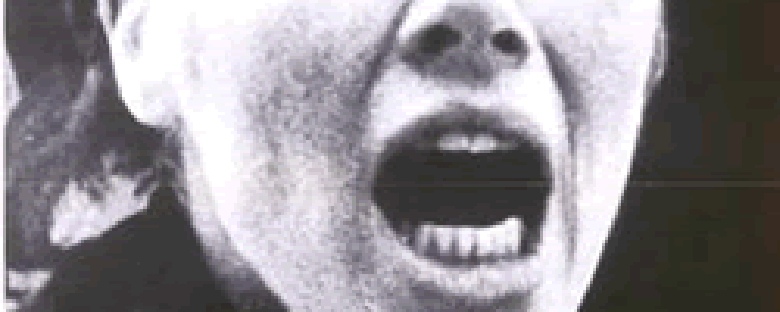Reviews
En passion
Ingmar Bergman
Sweden, 1969
Credits
Review by Leo Goldsmith
Posted on 12 May 2005
Source MGM DVD
In the final frames of The Passion of Anna, we see the actor, Max von Sydow, pacing back and forth in a barren, watery landscape. Using an optical printer, the celluloid frame is enlarged, we zoom in on von Sydow’s figure, and the image becomes gradually more indistinct until the actor’s body is a mass of floating splotches of color. We hear Ingmar Bergman’s voice on the soundtrack: “This time they called him Andreas Winkelman.”
The Passion of Anna is the last installment of Ingmar Bergman’s “island” series, the sequence of films that he made on the island of Fårö with Liv Ullmann in the 1960s. As such, it also culminates the most self-consciously metacinematic period in Bergman’s career. In each of these films, he and his cinematographer, Sven Nykvist, explore the narrative and technical capacities of the cinematic medium, calling attention to the processes of the film’s creation. Persona famously begins and ends with the image of a film projector’s arc lamp; and Hour of the Wolf announces itself as a “film adaptation” of its hero’s diary, and the sounds of the film set can be heard over the opening credit sequence.
The Passion of Anna, on the other hand, is ostensibly a film about the actor’s performance. Bergman has always professed his great love and admiration for actors, and this film allows them not only a great deal of room to develop and inhabit their characters (much of the dialogue is improvised), it also gives them the opportunity to explain their own feelings about them. Throughout the film, Bergman conducts “interviews” with his principal players (Ullmann, von Sydow, Bibi Andersson, and Erland Josephson), asking them to give their thoughts on the characters they play. If these interviews feel rather staged (or even scripted by Bergman), this makes the actors’ performances all the more fascinating and the line between actor and role all the more indistinct.
In many ways, the four characters at the center of The Passion of Anna are all expansions of Persona’s Elisabet Vogler, an actress who shrinks from the lies and hypocrisy of her life (and the “roles” she performs within it) and isolates herself from the outside world by becoming mute. In The Passion of Anna, Andreas Winkelman escapes the humiliation and failure of his life by secluding himself on an island; the cold Elis Vergerus (Josephson) shrouds himself with indifference, even cruelty; his wife, Eva Vergerus (Andersson), knows only her responsibility to other people, especially Elis; Anna (Ullmann) constructs a falsely idealized set of memories to evade her sense of guilt about the past. Each character, especially Anna, performs a certain role, lives a certain lie, as a means of insulating herself from the pain of human relationships.
Thus, the “passion” of the film’s title is not a physical suffering, like Christ’s at Golgotha, but an emotional one, an exposing of oneself to the world for the sake of love. Andreas partly undergoes this suffering when he attempts to reveal himself and the failure of his life to Anna, but Anna herself shrinks from the truth of her own past, fearful of its implications about herself and the consequences for their relationship. As we see in her dream (which is itself a kind of epilogue to Shame, with Eva/Anna/Ullmann arriving on the shores of a foreign land in a boatload of refugees), she fear that reaching out to others will only be met with contempt and violence. But the violence of the film’s conclusion, in which Andreas ferociously lashes out at Anna, is precipitated by her evasion of the truth, by her lies and her “damn lousy acting”, not by any act of reaching out. Ultimately, the “passion” of Anna is not depicted in the film — like Elisabet Vogler, she merely returns to the pattern of her life, destined to continually re-inhabit the roles she has created for herself.
Therefore, Bergman’s final intonation — “This time they called him Andreas Winkelman” — imparts a double meaning. It recognizes his consistent use of the same actors and archetypal characters, but it also emphasizes the cyclical nature of the situations depicted. This time, it is a story of Andreas and Anna, but next time it will be the story of two more crippled and isolated individuals, and the cycle will continue.
We don’t do comments anymore, but you may contact us here or find us on Twitter or Facebook.



